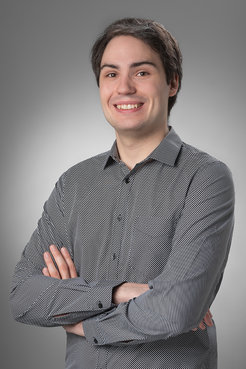Gravitational waves, articifical intelligence, and autonomous vehicles
Dr. Marlin Schäfer, once the group's first master's student, leaves for applied research after successfully completing his doctoral studies
How did you initially join our institute?

I had my first contact during my Bachelor thesis, which was about gravitational waves, too. To clarify a few questions, I contacted a PhD student at AEI back then. She helped a lot.
During the final phase of my thesis, I came across a publication that linked machine learning to the search for gravitational waves. I then decided that I really wanted to work on that topic in my Master's thesis.
Since I knew that the institute was doing a lot in the field of gravitational-wave searches, I tried to find a supervisor who was also keen on that topic. That semester I took a lecture by Frank Ohme and asked him as well. Fortunately, there was an open position in his group.
I don't think I could have done much better!
In a nutshell: What questions did you investigate in your Master's thesis?
We tried to detect gravitational waves from neutron star coalescences using neural networks – a type of artificial intelligence. There was no prior work on that at the time. And because the signals last much longer and are weaker, the problem is much more complicated than detecting gravitational waves from merging black holes.
We then focused on developing the method with artificial intelligence and comparing it to existing methods. It worked, though unfortunately not as well as established methods.
What happened after you finished your Master's thesis?
I had a lot of fun with my thesis; firstly because I found the topic extremely exciting, and secondly because the working environment at the institute is just great. So I already inquired during my Master's thesis if there was a possibility to do a PhD at the institute. Fortunately, I was able to start working on my doctorate directly after I finished my Master's thesis.
Your Phd studies coincided almost completely with the pandemic with all its restrictions. How did that influence your work?
At the beginning, of course, it felt very unfamiliar and it was a very uncertain time. I think the first three months were probably not very productive. But then I moved in with my girlfriend and had my own study in the new apartment. Together it made a huge difference and I quickly found my rhythm. Meanwhile, I think I was often more productive at home than I would have been in the office.
In that respect, the pandemic may even have helped me.
However, it was a great pity that I was hardly able to travel during this time and did not attend any international conferences outside Germany.
You completed your doctorate quickly in just about three years. What are the most important results of your dissertation?
The most important long-term result will probably be that we have shown in various papers how to objectively compare gravitational-wave searches based on artificial intelligence with established algorithms. I think this is an important basis for the future development of this research field.
In the short term, we have shown that there are areas where artificial intelligences already today have advantages over established search methods. These areas are still quite small, but hopefully they can be expanded soon. We have also shown which major “construction sites” still remain.
Where will your path take you now that you have successfully defended your dissertation and received your doctorate?
Having answered in my doctoral studies the most important questions I had about the application of artificial intelligence in the field of gravitational-wave searches, I am now turning to new tasks – this time in industry. In the future, I will be researching the development of autonomous vehicles.
What motivates you to move into the private sector, away from academic research?
For me, it's only a small change at first. I'll stay in research, but now in industry. For me, industry offers two decisive advantages: On the one hand, it gives you planning security, because you don't have to change locations every few years, and on the other hand, the salaries are also higher.
But in return, you also lose the freedom to explore your own questions. It comes with both advantages and disadvantages.
But since I was able to do an internship at the company during my doctorate, I already know roughly what to expect. I'm really looking forward to it!
To what extent can you now use the knowledge you gained at the institute with your new employer?
By conducting research on artificial intelligence, I have of course acquired knowledge that is currently in great demand in the business world. I'd have to be lying if I said that wasn't a factor in my decision to pursue a PhD.
Which experiences from your time in academic research do you think are particularly valuable?
It's also the case that in research you gain a lot of skills that are valuable in general.
You learn to critically question points of view and test them methodically. You learn to create models and communicate new ideas. At conferences you gain experience in networking, in collaborative research projects you learn international communication and discussion culture. Depending on the doctorate, you also learn to write grant proposals, create a budget, or manage a project. These are all things that prepare you excellently for a working life outside academia and will hopefully help me a lot in the future.
Thank you for the fascinating interview. We wish you all the best and much success at your new workplace!
Finally, I would like to thank all my colleagues at the institute again! I had a fantastic time here and I leave the institute with many great memories and new friends! I hope to meet you from time to time!












